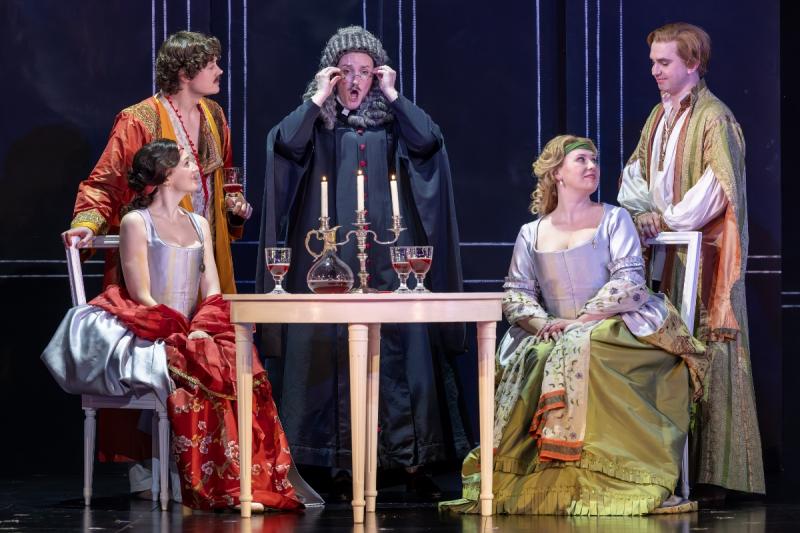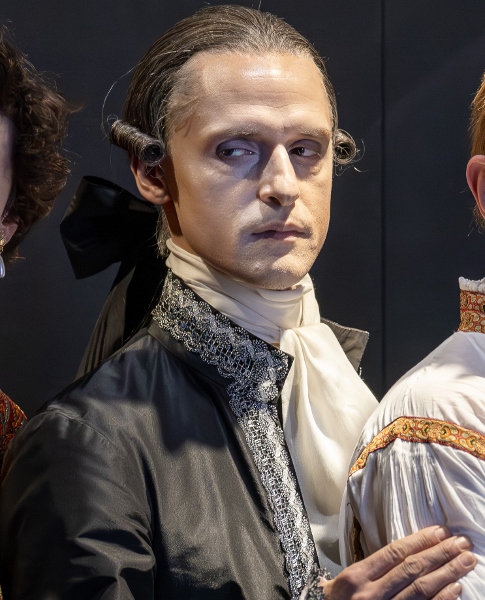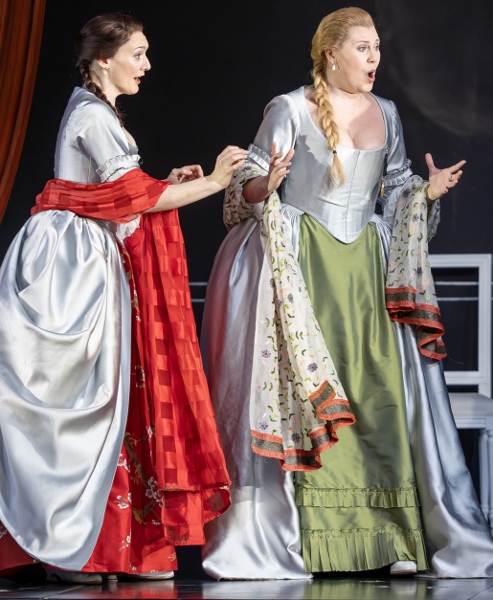Così fan tutte, Opera North review - a safe bet | reviews, news & interviews
Così fan tutte, Opera North review - a safe bet
Così fan tutte, Opera North review - a safe bet
Voices and personalities in balance and contrast in revived Albery production

Reviving Tim Albery’s production of Così fan tutte, now almost 20 years old, again at Leeds Grand Theatre, Opera North have a bet that’s as safe as Don Alfonso’s in the story – that “Women are all the same”. It’s a sure-fire winner, and the best part this time round lies in the balance and contrast of both voices and personalities in the casting of the central pairs of lovers.
Albery sees the piece as a kind of Enlightenment-era scientific demonstration, in which truth is to be revealed by an unblinking camera lens. Almost all the action takes place inside a giant “camera obscura”, as we see the two sisters in love with two brothers and the bet the lads make with the older (and more cynical) philosopher, Don Alfonso, as to whether their girls’ fidelity will last even a day once they are on their own and tempted by “lovers” (their opposite numbers in disguise). Despina, the amoral ladies’ maid, helps make the test become reality.
 The outcome is never in doubt, and maybe it’s a sad and misogynistic story. But the guys are equally duplicitous, as it turns out, and pretty vain with it. The opera has no real place – ostensibly Naples, it could be anywhere with a sea-port – and the boys disguise themselves as “Albanians” in the original, which means men from somewhere just exotic enough to give them a touch of romance. Albery’s idea takes away even the backgrounds of seaside and gardens, but he keeps the timeframe strictly in Mozart and Lorenzo da Ponte’s period. The girls’ costumes gradually change, in line with their morals, as the story proceeds, to match the growth of individuality in the characters (design by Tobias Hoheisel).
The outcome is never in doubt, and maybe it’s a sad and misogynistic story. But the guys are equally duplicitous, as it turns out, and pretty vain with it. The opera has no real place – ostensibly Naples, it could be anywhere with a sea-port – and the boys disguise themselves as “Albanians” in the original, which means men from somewhere just exotic enough to give them a touch of romance. Albery’s idea takes away even the backgrounds of seaside and gardens, but he keeps the timeframe strictly in Mozart and Lorenzo da Ponte’s period. The girls’ costumes gradually change, in line with their morals, as the story proceeds, to match the growth of individuality in the characters (design by Tobias Hoheisel).
It’s one of the few productions from Opera North seen these days which are sung in English. That’s a good idea (the compact and clever text is an entertainment in itself), but it’s also good that this time it was also projected on side-screens – previously some of the jokes have been lost as overlapping words in ensembles are always difficult to follow.
It all begins with Don Alfonso (Quirijn De Lang, pictured above right) on the stage at the start of the overture, be-gowned as if about to impart instruction (the piece is sub-titled “The School for Lovers”, after all). Dumb-show during the overture is almost conventional these days, but it doesn’t need to last long and once the tempo picks up he disappears and leaves it to Mozart to brighten the mood. Clemens Schuldt conducts with assured grace and constant vitality: he looks after his singers and obtains moments of great beauty from the orchestra.
 And the central pairs of young lovers are believably youthful. Alexandra Lowe (Fiordiligi) and Heather Lowe (Dorabella), as the two sisters (pictured left) may share a surname but are not sisters in real life – they do however share the training of the Royal Northern College of Music in their backgrounds, and their vocal mastery and ability to impart character are equally apparent.
And the central pairs of young lovers are believably youthful. Alexandra Lowe (Fiordiligi) and Heather Lowe (Dorabella), as the two sisters (pictured left) may share a surname but are not sisters in real life – they do however share the training of the Royal Northern College of Music in their backgrounds, and their vocal mastery and ability to impart character are equally apparent.
The virtue of their casting here is that each one’s vocal tone is quite distinct and yet complementary, and they play their parts as distinct and balancing personalities, too. Alexandra Lowe makes Fiordiligi – a role she sang at the RNCM as a student – a genuine innocent with purest, glowing sound to match, and when her fall from grace comes we experience it with her.
Heather Lowe is more sensual from the start (she makes something noticeable of her line about Ferrando – her original lover – being “possessive”), and there’s no doubt she’s up for flirting with someone else with relatively little encouragement. Indeed her scene with Guglielmo begins to seem as if they both know exactly what they’re up to and are enjoying the play-acting.
Anthony Gregory (Ferrando) is an English tenor of mellow, refined English tone and joins in the fun very well, albeit with a straight face. Henry Neill (who made an impression as the marrying Figaro at Clonter Opera a few years ago) is a more earthy and knowing Guglielmo – but still capable of a telling burst of emotion at the thought of his lover’s betrayal.
Gillene Butterfield enjoys herself as the sparky maid Despina, showing great comic timing and making the most of her “Any girl 15 or over …”.
And Quirijn De Lang maintains his air of gentle superiority, educating the youngsters in their relationship studies – and winning his bet, too.
rating
Explore topics
Share this article
The future of Arts Journalism
You can stop theartsdesk.com closing!
We urgently need financing to survive. Our fundraising drive has thus far raised £49,000 but we need to reach £100,000 or we will be forced to close. Please contribute here: https://gofund.me/c3f6033d
And if you can forward this information to anyone who might assist, we’d be grateful.

Subscribe to theartsdesk.com
Thank you for continuing to read our work on theartsdesk.com. For unlimited access to every article in its entirety, including our archive of more than 15,000 pieces, we're asking for £5 per month or £40 per year. We feel it's a very good deal, and hope you do too.
To take a subscription now simply click here.
And if you're looking for that extra gift for a friend or family member, why not treat them to a theartsdesk.com gift subscription?
more Opera
 La bohème, Opera North review - still young at 32
Love and separation, ecstasy and heartbreak, in masterfully updated Puccini
La bohème, Opera North review - still young at 32
Love and separation, ecstasy and heartbreak, in masterfully updated Puccini
 Albert Herring, English National Opera review - a great comedy with depths fully realised
Britten’s delight was never made for the Coliseum, but it works on its first outing there
Albert Herring, English National Opera review - a great comedy with depths fully realised
Britten’s delight was never made for the Coliseum, but it works on its first outing there
 Carmen, English National Opera review - not quite dangerous
Hopes for Niamh O’Sullivan only partly fulfilled, though much good singing throughout
Carmen, English National Opera review - not quite dangerous
Hopes for Niamh O’Sullivan only partly fulfilled, though much good singing throughout
 Giustino, Linbury Theatre review - a stylish account of a slight opera
Gods, mortals and monsters do battle in Handel's charming drama
Giustino, Linbury Theatre review - a stylish account of a slight opera
Gods, mortals and monsters do battle in Handel's charming drama
 Susanna, Opera North review - hybrid staging of a Handel oratorio
Dance and signing complement outstanding singing in a story of virtue rewarded
Susanna, Opera North review - hybrid staging of a Handel oratorio
Dance and signing complement outstanding singing in a story of virtue rewarded
 Ariodante, Opéra Garnier, Paris review - a blast of Baroque beauty
A near-perfect night at the opera
Ariodante, Opéra Garnier, Paris review - a blast of Baroque beauty
A near-perfect night at the opera
 Cinderella/La Cenerentola, English National Opera review - the truth behind the tinsel
Appealing performances cut through hyperactive stagecraft
Cinderella/La Cenerentola, English National Opera review - the truth behind the tinsel
Appealing performances cut through hyperactive stagecraft
 Tosca, Royal Opera review - Ailyn Pérez steps in as the most vivid of divas
Jakub Hrůša’s multicoloured Puccini last night found a soprano to match
Tosca, Royal Opera review - Ailyn Pérez steps in as the most vivid of divas
Jakub Hrůša’s multicoloured Puccini last night found a soprano to match
 Tosca, Welsh National Opera review - a great company reduced to brilliance
The old warhorse made special by the basics
Tosca, Welsh National Opera review - a great company reduced to brilliance
The old warhorse made special by the basics
 BBC Proms: The Marriage of Figaro, Glyndebourne Festival review - merriment and menace
Strong Proms transfer for a robust and affecting show
BBC Proms: The Marriage of Figaro, Glyndebourne Festival review - merriment and menace
Strong Proms transfer for a robust and affecting show
 BBC Proms: Suor Angelica, LSO, Pappano review - earthly passion, heavenly grief
A Sister to remember blesses Puccini's convent tragedy
BBC Proms: Suor Angelica, LSO, Pappano review - earthly passion, heavenly grief
A Sister to remember blesses Puccini's convent tragedy
 Orpheus and Eurydice, Opera Queensland/SCO, Edinburgh International Festival 2025 review - dazzling, but distracting
Eye-popping acrobatics don’t always assist in Gluck’s quest for operatic truth
Orpheus and Eurydice, Opera Queensland/SCO, Edinburgh International Festival 2025 review - dazzling, but distracting
Eye-popping acrobatics don’t always assist in Gluck’s quest for operatic truth

Add comment